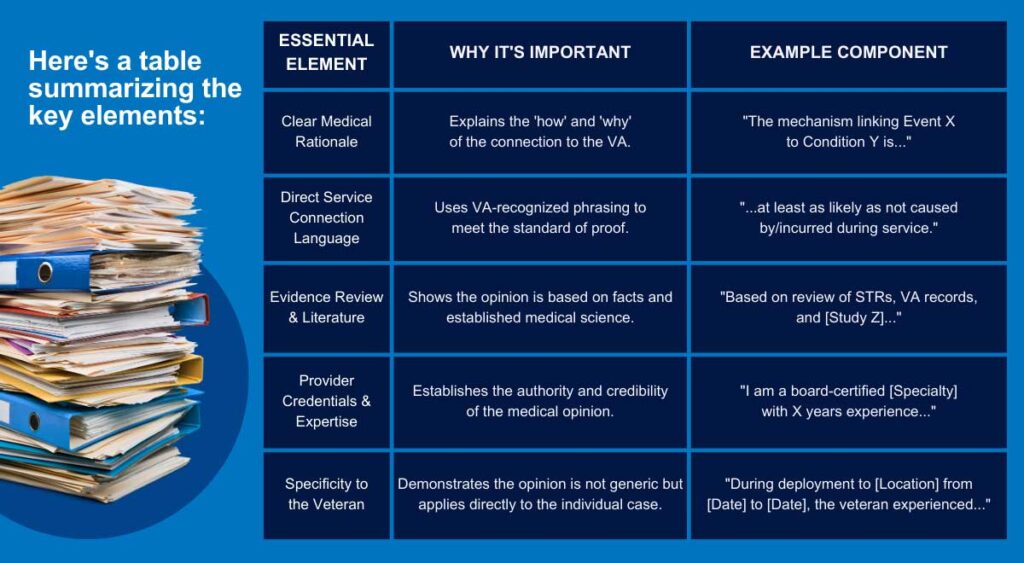Veterans applying for disability benefits understand the significance of a strong nexus letter. This vital document often determines the outcome of a VA claim. So, what makes a nexus letter persuasive and effective? Let’s examine the five key elements that strengthen your case for service connection.
A nexus letter, also known as a va nexus letter, serves a critical function: it connects a veteran’s current medical condition to their military service. Typically written by a licensed medical professional, this letter provides an expert medical opinion, acting as crucial medical evidence in a VA disability claim. Without a convincing nexus letter establishing this medical nexus, many disability claims face denial, leaving veterans without the disability benefits they deserve.
Grasping the components of a strong nexus letter can greatly enhance the likelihood of a favorable outcome in the va claims process. This understanding empowers veterans to seek out or help their medical provider craft the most compelling supporting evidence possible. Here are the five essentials every veteran should know about obtaining strong nexus letters.

1. Clear Medical Rationale
A foundation of any strong nexus letter is a clear, logical medical rationale explaining how the veteran’s condition is linked to their military service. The medical professional writing the letter must articulate their reasoning plainly. They need to effectively connect the dots between the veteran’s experiences during military service and their current disability or health issues.
This means going beyond simply stating a connection exists. The qualified medical provider should detail the biological or physiological process involved. For instance, explaining how exposure to loud noises caused cochlear damage leading to tinnitus, or how a specific in-service event caused trauma leading to PTSD, provides a concrete basis for the medical opinion.
An example of a clear rationale: “The veteran’s diagnosed condition of degenerative disc disease in the lumbar spine is, at least as likely as not, caused by the repetitive heavy lifting and carrying of equipment required during his infantry service, documented in his performance reviews and service treatment records.” This explicit reasoning helps the VA adjudicator understand the medical pathway from service to the current disability, fulfilling a key requirement the VA requires for establishing service connection.
2. Direct Service Connection Language
The nexus letter must explicitly state the connection between the veteran’s condition and a specific event, injury, or circumstance during military service. Ambiguous or tentative language undermines the letter’s value. The VA looks for a definitive statement linking the current disability to service; precision is paramount for a strong nexus.
Avoid phrases like “might be related” or “could possibly stem from.” Instead, the letter should use phrasing recognized by the VA, such as “it is at least as likely as not” (representing a 50% or greater probability) that the condition is service-connected. This specific language directly addresses the VA’s standard of proof for service connection in disability claims.
Consider this contrast: a weak statement might be, “The veteran’s anxiety seems related to his combat tour.” A strong statement clarifies: “The veteran’s diagnosed Post-Traumatic Stress Disorder (PTSD) is at least as likely as not directly caused by his exposure to combat and an IED explosion during his deployment to Iraq from 2007-2008, as detailed in his service records and personal statements.” This direct linkage, identifying the specific in-service event or exposure, creates a clear nexus for the VA reviewer.
3. Explanation of Medical Literature and Evidence Review
An impactful nexus letter does more than just state a medical opinion; it supports that opinion with evidence. This includes referencing relevant medical literature or medical studies that establish a known link between certain service exposures or events and specific health conditions. Citing peer-reviewed research adds significant weight and credibility to the medical provider’s professional medical opinion.
For example, when addressing conditions potentially linked to Gulf War service or Agent Orange exposure, citing scientific studies recognized by the VA can be very effective. A statement like, “Medical literature, including the findings reported by the National Academies of Sciences, Engineering, and Medicine, links exposure to Agent Orange with an increased risk of developing Type 2 Diabetes, the condition diagnosed in this veteran,” substantiates the nexus opinion beyond the individual case.
Furthermore, the letter must explicitly state that the medical professional has reviewed the veteran’s pertinent records. This includes service treatment records (STRs), VA medical records, private medical records, and potentially lay statements or buddy letters. Documenting this review shows the provider has based their opinion on a thorough understanding of the veteran’s entire medical history and service background, not just a brief examination.
4. Credentials and Expertise of the Provider
The credibility of the person writing the nexus letter significantly influences its impact. The VA gives considerable weight to opinions from qualified medical professionals, especially those with specialization or expertise relevant to the veteran’s condition. The letter should clearly state the provider’s credentials, board certifications, specialties, and any experience they have in treating the specific condition or working with veterans.
A letter from a board-certified cardiologist discussing a heart condition, or a licensed psychologist addressing mental health conditions like PTSD, will generally be more persuasive than an opinion from a general primary care physician for those specific issues. However, a primary care provider can still write a strong letter if they demonstrate a thorough review of records and provide solid reasoning, especially if they have a long-standing treatment relationship with the veteran.
Including a statement such as, “I am a board-certified orthopedic surgeon with over 20 years of experience treating complex joint injuries, including those commonly sustained during military service,” establishes the provider’s authority. Whether the opinion comes from VA doctors or private qualified healthcare providers, clearly stating their qualifications is essential for a strong nexus letter.
5. Specificity to the Veteran’s Case
A generic, template-like nexus letter is far less effective than one specifically addressing the veteran’s individual circumstances. The letter must be personalized, referencing specific details from the veteran’s medical history, service treatment records, and military service. This demonstrates that the qualified medical provider has carefully considered the unique aspects of the veteran’s disability claim.
The letter should integrate details like dates of service, specific duties, locations of deployment, relevant in-service events (injuries, exposures, stressors), and the timeline of symptom onset and diagnosis. For instance: “Review of Mr. Johnson’s service treatment records from his time at Fort Benning (2010-2014) shows multiple visits for knee pain after airborne training jumps. His current osteoarthritis diagnosis in both knees is consistent with the chronic joint stress experienced during that period.”
This level of detail assures the VA that the nexus opinion is well-founded and directly applicable to the veteran’s current condition and past service. It shows the connection is not speculative but grounded in the actual facts of the veteran’s medical and military history. Providing comprehensive details tailored to the veteran’s current disability makes the letter significantly more compelling.

The Impact of a Weak Nexus Letter
Just as a strong nexus letter can be pivotal for claim approval, a weak one can significantly undermine a veteran’s case for VA disability benefits. Letters that are vague, lack clear medical reasoning, fail to review relevant records, or neglect to explicitly connect the veteran’s condition to their military service are often dismissed by VA adjudicators. A poorly constructed letter might be deemed speculative, insufficient, or lacking probative value.
Common pitfalls include merely stating a condition exists without explaining its origin, using non-committal language, or failing to mention a review of the veteran’s medical records service treatment information. For example, a letter saying “The veteran has back pain, possibly from service” lacks the necessary detail and conviction. This type of weak medical evidence forces the VA reviewer to guess or seek clarification, often leading to delays or denial of the disability claim.
Furthermore, if a letter provides an opinion that the condition was definitely not caused by service or suggests an alternative cause without strong evidence, it can be actively harmful. Veterans must understand that insufficient supporting evidence, including a weak nexus opinion, is a common reason for claim denials in the va disability claims process.
Understanding the “At Least As Likely As Not” Standard
A crucial concept underpinning nexus letters is the VA’s standard of proof for service connection: “at least as likely as not.” This standard, established by veterans law, means there must be at least a 50 percent probability that the veteran’s condition is linked to their military service. The evidence does not need to prove certainty; it just needs to show that the connection is plausible and as probable as any other cause.
A strong nexus letter directly addresses this standard. The medical professional should explicitly state their opinion using this terminology, for example: “It is at least as likely as not (50% probability or greater) that the veteran’s current diagnosed condition of [Condition Name] was caused by or aggravated by their [In-service event/exposure/injury].” This phrasing clearly signals to the VA that the medical opinion meets the required threshold.
Failing to use this language, or using weaker terms like “possibly,” “could be,” or “may be related,” does not satisfy the VA requirement. A qualified medical provider familiar with VA claims understands the importance of this specific wording. Ensuring your nexus letter incorporates this standard is vital for navigating the claims process successfully.
Finding a Qualified Medical Professional for Your Nexus Letter
Securing a nexus letter requires a qualified medical professional willing to review your case and offer a medical opinion. This could be your regular primary care doctor, a specialist treating your condition, a VA doctor, or an independent medical examiner. While VA doctors can sometimes provide nexus opinions, they may be hesitant or constrained by VA policies; many veterans find more success with private medical providers.
When seeking a provider for writing nexus letters va doctors might refer you elsewhere, or you might approach a private qualified healthcare provider. Look for a licensed medical professional, ideally with experience relevant to your condition. It is helpful, though not strictly required, if they have some familiarity with the VA disability claims process and the specific requirements for nexus letters.
Provide the chosen medical provider with all relevant documentation. This includes your service treatment records (often called medical records service treatment), post-service medical records, diagnostic test results, and any lay evidence supporting your claim. A comprehensive review of the veteran’s entire medical history allows the provider to formulate an informed and well-supported nexus opinion.

How Specialized Services Can Help Obtain Nexus Letters VA Approves
Given the specific requirements and the importance of a well-crafted nexus letter, some veterans opt for specialized services. These organizations connect veterans with qualified medical professionals who understand the nuances of the VA claims process and specialize in evaluating medical evidence for service connection. They focus on ensuring the nexus letter provides comprehensive support for the va disability claim.
Services like these often employ or contract with licensed medical professionals across various specialties. They can assist in gathering and organizing medical records, identifying relevant medical literature, and ensuring the final nexus letter contains all the essential elements discussed earlier: clear rationale, direct connection language, evidence review, provider credentials, and case specificity. This can be particularly beneficial for complex cases, such as those involving mental health conditions, traumatic brain injury (TBI), secondary conditions, or conditions related to toxic exposures like those encountered during the Gulf War.
For example, such a service could connect a veteran seeking service connection for sleep apnea secondary to PTSD with a qualified medical expert. This expert would review the veteran’s medical history, relevant medical studies linking PTSD and sleep apnea, and provide a professional medical opinion addressing the specific connection in the veteran’s case. This approach aims to produce letters va adjudicators find persuasive.
The Value of Investing in Strong Medical Evidence
Some veterans may be reluctant to incur costs associated with obtaining an independent medical opinion or using a specialized service for their nexus letter. However, viewing this as an investment in the disability claim can be helpful. A strong, well-reasoned nexus letter serves as powerful medical evidence and can significantly increase the chances of claim approval and receiving deserved disability benefits.
Consider the potential long-term value of VA disability compensation compared to the one-time cost of securing robust supporting evidence. While there’s no guarantee of approval, a compelling nexus letter directly addresses the core requirement of establishing service connection, making it harder for the VA to deny the claim based on insufficient medical linkage.
Ultimately, the decision rests with the veteran, but obtaining a strong nexus letter is a proactive step towards building a successful VA disability claim. It ensures that a qualified medical professional has thoroughly evaluated the link between the veteran’s condition and their service. This medical opinion is often the cornerstone upon which a successful va claim is built.

Tips for Getting a Strong Nexus Letter
If you are pursuing a nexus letter for your VA disability claim, proactive preparation can make a difference. Arm yourself with knowledge about what constitutes strong medical evidence. Here are some practical tips:
- Select your medical provider carefully. If possible, choose a doctor or specialist familiar with your veteran’s condition and, ideally, the VA claims process or willing to learn about the specific requirements.
- Prepare your information thoroughly. Gather all relevant documents: service treatment records, DD214, private medical records service documentation, diagnostic reports, and any lay statements related to your condition and service.
- Communicate clearly with the provider. Explain that you need a medical nexus opinion for a VA disability claim and specifically discuss the need to link your current condition to an in-service event, injury, or disease.
- Request a comprehensive review. Ask the medical professional to explicitly state in the letter that they have reviewed your pertinent medical and service records.
- Discuss the key elements. Gently guide the provider by mentioning the importance of a clear rationale, direct connection language (“at least as likely as not”), supporting medical literature (if applicable), their credentials, and specificity to your case. You could even provide them with a checklist or example outline.
- Review the draft if possible. Before the letter is finalized, ask if you can review it to check for accuracy regarding your service details and medical history, ensuring it accurately reflects your veteran’s entire situation.
Remember, the goal is to obtain a letter that clearly and convincingly explains the medical nexus. Taking the time to facilitate the creation of a strong nexus letter can significantly impact the outcome of your disability claims process. This effort helps ensure the letter serves its purpose effectively.
Conclusion
A strong nexus letter is an indispensable asset when pursuing VA disability claims. Its strength lies in containing five critical components: a clear medical rationale, language establishing a direct service connection (“at least as likely as not”), reference to medical literature and evidence review, clear statement of the provider’s credentials, and specific details pertinent to the veteran’s unique case. Avoiding vague or poorly substantiated letters is crucial, as they can weaken rather than support your va disability claim.
For veterans facing complex medical conditions or navigating the intricacies of the va claims process, seeking assistance from specialized services that connect them with experienced, qualified medical professionals can be a valuable step. These services focus on crafting nexus letters va requires, ensuring all necessary elements are present to provide comprehensive support. Remember, investing effort and potentially resources into securing strong medical evidence, particularly a compelling medical nexus opinion, is often a wise strategy for achieving a successful claim outcome and accessing the VA disability benefits earned through service.
By understanding these five essentials—clear rationale, direct connection, evidence-based reasoning, qualified provider, and case specificity—veterans are better positioned to obtain the powerful nexus letter needed to substantiate their disability claim. This knowledge empowers veterans throughout the claims process. A well-prepared nexus letter serves as clear proof connecting a veteran’s current condition to their dedicated military service.

